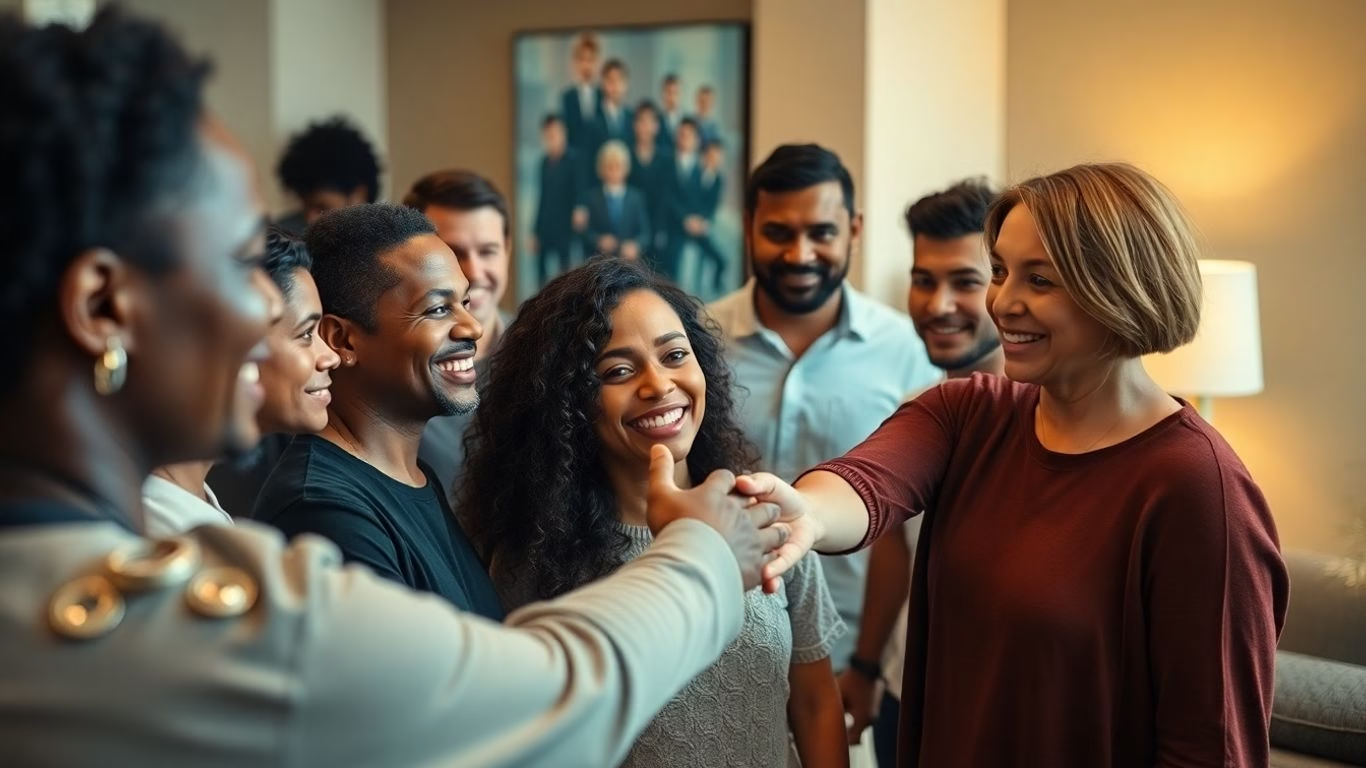It can feel tough to talk about LGBTQ+ rights, especially when you’re in spaces that aren’t always the most welcoming. But being an ally, someone who supports and stands up for others, is super important. This isn’t just about being nice; it’s about making real change. We’re going to look at how folks can step up, even when it’s a bit awkward, to help create a more equal world for everyone. The Power of Allyship: Supporting LGBTQ+ Rights in Conservative Environments is something we can all contribute to.
Key Takeaways
- Being an ally means actively working to end unfairness, not just tolerating differences. It involves supporting and speaking up for people who are often left out.
- Real change happens when we move beyond just sharing things online. It means taking concrete steps like pushing for fair policies and making places feel safe for everyone.
- It’s okay to feel uncomfortable when learning about bias and privilege. Facing these feelings and having honest talks is part of growing and becoming a better ally.
- Supporting LGBTQ+ rights in conservative areas takes effort. It’s about building connections, showing understanding, and sticking with advocacy over time.
- Being an ally is a continuous learning process. Stay informed about current issues, listen to LGBTQ+ people’s experiences, and be willing to adapt your approach.
Understanding The Foundation Of Allyship

Defining Allyship Beyond Tolerance
Being an ally isn’t just about not being against something; it’s about actively supporting something. It’s more than just tolerating LGBTQ+ people or their rights. True allyship means working to dismantle unfair systems and standing up for equality. It’s a commitment to action, not just a passive agreement. Think of it like this: you can tolerate a leaky faucet, but you’d actively fix it if it was flooding your house. Allyship is about fixing the flood.
The Role Of Dominant Social Groups In Advocacy
People who belong to groups that typically hold more social power, like cisgender and heterosexual individuals, have a unique role to play. Because they often have more influence, their support can bring about significant change. When someone from a dominant group speaks up, it can open doors and shift perspectives in ways that might be harder for those already facing discrimination. It’s about using that existing influence to create a more level playing field.
Breaking The Cycle Of Socialization
We all grow up learning certain ways of thinking about the world, often without even realizing it. This is called socialization. Sometimes, these learned ideas can lead to unfair biases or assumptions about people who are different from us. Becoming an ally means recognizing these ingrained patterns in ourselves and actively working to unlearn them. It’s a process of questioning what we’ve always been told and choosing to think differently, especially when it comes to how we treat others.
- Recognize your own biases: We all have them, even if we don’t want to admit it.
- Challenge assumptions: Don’t just accept things as they are; ask why.
- Seek out different perspectives: Listen to people whose experiences differ from yours.
Breaking free from how we were raised to think is tough. It means looking honestly at ourselves and the world, and sometimes that’s not comfortable. But it’s a necessary step to truly support others and build a fairer society for everyone.
Taking Action: Practical Steps For Effective Allyship
Being an ally isn’t just about saying the right words; it’s about doing the right things. It means moving past just thinking about issues and actually getting involved in ways that make a difference. This isn’t about being a loudmouth all the time, but about knowing when and how to step up. It’s about making sure our actions actually help create a more welcoming space for everyone.
Moving Beyond ‘Political Hobbyism’ To Tangible Impact
Sometimes, it feels like we’re just talking about issues without really changing anything. That’s what some call ‘political hobbyism’ – engaging with topics online or in casual chats, but not much else. Real allyship means taking concrete steps. It’s about looking at where you are and what you can do in your own life and community. Think about your workplace, your social circles, or even your family. Are there policies or practices that could be more inclusive? Can you speak up when you hear something that’s not okay? It’s about making a real impact, not just a symbolic one.
Advocating For Inclusive Policies And Practices
One of the most effective ways to be an ally is to push for changes in policies and how things are done. This could mean a lot of different things depending on where you are. For example, in a workplace, it might involve suggesting that the company update its non-discrimination policy to explicitly include gender identity and sexual orientation. Or maybe it’s about making sure that healthcare benefits are available to all employees and their partners, regardless of gender. In schools, it could be about advocating for curriculum that includes diverse perspectives or ensuring that school facilities are accessible to transgender students. It’s about looking at the rules and systems in place and asking, ‘How can we make this better for LGBTQ+ people?’
Here are a few ideas:
- Reviewing company handbooks for outdated or exclusionary language.
- Asking HR about diversity training that covers LGBTQ+ issues.
- Supporting employee resource groups (ERGs) focused on LGBTQ+ inclusion.
- Encouraging the use of gender-neutral restrooms where feasible.
Sometimes, the most powerful actions are the quiet ones that happen behind the scenes, like having a one-on-one conversation with a decision-maker or providing research that supports a more inclusive policy. It’s not always about grand gestures; consistent, thoughtful effort matters a lot.
Creating Safe And Welcoming Environments
Making spaces feel safe and welcoming is a big part of allyship. This goes beyond just not being discriminatory yourself; it’s about actively creating an atmosphere where LGBTQ+ individuals feel respected and valued. Using inclusive language is a simple but important step. Instead of assuming someone’s partner is of a certain gender, use terms like ‘partner’ or ‘significant other.’ When introducing yourself, sharing your own pronouns can help normalize the practice and show that you respect others’ pronouns. It’s also about being aware of microaggressions – those small, often unintentional comments or actions that can make someone feel excluded or devalued – and addressing them when you see them. This might feel awkward sometimes, but it’s necessary for building trust and genuine inclusion.
Navigating Discomfort In The Pursuit Of Equality

Confronting Personal Biases And Privilege
Being an ally isn’t always easy, and sometimes it feels downright awkward. This discomfort can bubble up from inside us or come from outside. It’s like realizing you’ve been operating with a blind spot for a long time. We all have these, thanks to a lifetime of messages we’ve absorbed without even noticing. Tools like the Implicit Association Test can help shine a light on these hidden biases, showing us where our automatic associations might be skewed. It’s not about feeling bad; it’s about seeing clearly so we can do better.
- Self-reflection is key: Take time to examine your own assumptions and beliefs.
- Recognize that everyone has biases, no matter how progressive they think they are.
- Use available resources to identify and understand your personal biases.
Confronting your own privilege isn’t about guilt; it’s about acknowledging the advantages you have and understanding how they shape your perspective. This awareness is the first step toward more effective advocacy.
Embracing Uncomfortable Conversations
Sometimes, stepping into allyship means having conversations that feel a bit shaky. You might worry about what others will think, or if you’re saying the right thing. Maybe you’ve seen something that didn’t sit right, like someone using the wrong pronouns for a student, and you hesitated to speak up in a group. It’s easy to beat yourself up afterward, but that energy is better spent preparing for the next time. The goal isn’t perfection; it’s progress.
- Practice speaking up: Start in smaller settings or one-on-one before tackling larger groups.
- Focus on the impact of words and actions, not just intentions.
- Prepare talking points for common scenarios where you might need to intervene.
The Importance Of Self-Forgiveness And Growth
Look, nobody gets allyship perfect on the first try. There will be stumbles, awkward moments, and times you wish you’d handled something differently. Maybe you said the wrong thing, or didn’t say anything at all when you felt you should have. It’s easy to get stuck in a loop of self-criticism. But that negative energy doesn’t help anyone. Instead, acknowledge the mistake, learn from it, and give yourself grace. True growth comes from learning and moving forward, not from dwelling on past missteps.
| Area of Growth | Initial Reaction | Improved Approach |
|---|---|---|
| Misgendering someone | Silence, embarrassment | Immediate correction, apology |
| Witnessing bias | Hesitation, avoidance | Direct, calm intervention |
| Overhearing prejudice | Internal discomfort | Educating the speaker |
The Power Of Allyship: Supporting LGBTQ+ Rights In Conservative Environments
Leveraging Societal Power For Change
It’s easy to feel like individual actions don’t make much of a difference, especially when you’re trying to push for change in places that might not be super welcoming to LGBTQ+ folks. But here’s the thing: people who are part of the dominant social group often have more influence, whether they realize it or not. When someone from that group speaks up or takes action, it can carry a lot more weight. Think about it – if a company’s CEO announces a new policy supporting LGBTQ+ employees, that’s going to have a bigger ripple effect than just one person mentioning it in a meeting. It’s about using that existing societal power, not to silence others, but to open doors and create space for fairness.
Building Bridges Through Understanding And Empathy
Sometimes, the biggest hurdle is just getting people to listen. In more conservative settings, there can be a lot of ingrained ideas or even fear around LGBTQ+ issues. That’s where empathy comes in. It’s not about agreeing with everyone’s views, but about trying to understand where they’re coming from, even if you disagree. When you can connect with someone on a human level, talk about shared values like fairness or family, it makes it easier to build trust. This can open the door for conversations that might otherwise shut down immediately. It’s about finding common ground, even when it feels like there isn’t any.
The Long-Term Impact Of Consistent Advocacy
Pushing for LGBTQ+ rights isn’t a one-and-done kind of deal. It’s more like tending a garden. You plant seeds, water them, and keep at it, even when you don’t see immediate results. Small, consistent actions add up over time. This could be anything from correcting someone when they use the wrong pronoun, to supporting LGBTQ+ friendly businesses, to showing up for events. Each of these acts, especially when done repeatedly and by many people, helps to shift the culture. It shows that support isn’t just a fleeting trend, but a steady commitment to equality. This persistent effort is what truly creates lasting change.
Here are some ways consistent advocacy makes a difference:
- Visibility: When allies are consistently present and vocal, it signals to LGBTQ+ individuals that they are not alone.
- Normalization: Repeated exposure to inclusive language and actions helps to make LGBTQ+ identities and experiences more familiar and accepted.
- Policy Change: Consistent pressure from allies can influence decision-makers to adopt more inclusive policies and practices.
- Cultural Shift: Over time, sustained advocacy contributes to a broader societal shift towards greater acceptance and equality.
Sometimes, the most effective advocacy happens not in grand gestures, but in the quiet, everyday moments. It’s about showing up, speaking up when you can, and being a reliable presence for those who need it. This steady commitment, even when it feels small, builds momentum and chips away at resistance.
Continuous Learning And Growth As An Ally
Being an ally isn’t a one-and-done kind of thing. It’s more like a continuous journey, always evolving. You can’t just read a book or attend one workshop and call yourself an ally forever. The landscape of LGBTQ+ rights and understanding is always changing, and so should our approach. It means staying curious and committed to learning, even when it gets a little uncomfortable.
Staying Informed On Evolving Issues
Think about it – new terms pop up, societal views shift, and legal protections change. It’s a lot to keep track of! To be a good ally, you’ve got to make an effort to keep up. This could mean reading articles, listening to podcasts, or following LGBTQ+ advocates online. It’s about actively seeking out information rather than waiting for it to find you. For instance, understanding the nuances of gender identity and expression is key, and that knowledge base grows over time. Staying informed helps you avoid making assumptions and ensures your support is relevant and respectful. It’s about being a reliable source of support, not someone who’s always a step behind.
The Iterative Nature Of Allyship
Allyship is definitely iterative. You try something, maybe it works, maybe it doesn’t, and you learn from it. You might mess up sometimes – we all do. The important part is not to get stuck beating yourself up over it. Instead, take that experience, figure out what went wrong, and use it to do better next time. It’s about progress, not perfection. We have to forgive ourselves and then put that energy into speaking up or acting differently when the next opportunity arises. It’s a cycle of trying, learning, and adjusting.
Listening To And Amplifying LGBTQ+ Voices
This is a big one. The most effective way to learn and grow as an ally is to listen to the people directly affected. Don’t assume you know what the LGBTQ+ community needs or wants. Ask questions, pay attention, and really hear what people are saying. Then, use your position to amplify those voices. If you’re in a meeting and someone’s idea is being overlooked, speak up. If you hear misinformation, gently correct it. It’s not about speaking for the community, but speaking with them and making sure their perspectives are heard and valued. This means seeking out opportunities to hear their stories and experiences, whether through personal conversations or engaging with their creative work. It’s about making space for them to lead.
Educating Others To Foster Inclusive Communities
So, you’ve started to get a handle on things, right? You’re learning, you’re showing up, and you’re trying to make a difference. That’s awesome. But being an ally isn’t just about what you do for yourself or directly for LGBTQ+ folks; it’s also about helping others get on board. Think of it like this: one person planting a garden is nice, but a whole neighborhood doing it? That’s a real change.
Sharing Knowledge And Raising Awareness
This is where you become a bit of a bridge-builder. It’s about taking what you’ve learned and sharing it in ways that make sense to people who might not know much about LGBTQ+ issues, or who might even have some old-school ideas. It doesn’t mean you have to give lectures or anything. Sometimes, it’s just a casual chat over coffee, or maybe sharing an interesting article you read. The goal is to gently introduce new ideas and help people see things from a different perspective. It’s about planting seeds of understanding.
- One-on-one chats: These can be super effective. When you talk to someone you know, you can tailor what you say to their interests and concerns. You can answer their questions honestly and help them connect the dots.
- Sharing resources: Found a great podcast or a helpful website? Pass it along! Sometimes people just need a starting point, and you can be that for them. The Human Rights Campaign has a ton of information that’s easy to digest.
- Using inclusive language: This is a small thing that makes a big difference. When you start using terms like ‘partner’ or ‘significant other’ instead of assuming someone has a boyfriend or girlfriend, you’re not only being respectful, but you’re also showing others how it’s done.
Addressing Anti-LGBTQ+ Incidents Effectively
Okay, so sometimes things get heated. Someone says something out of line, or an incident happens that’s just not okay. This is where being an ally gets a little tougher, but it’s also really important. You can’t just let it slide. How you respond can teach others a lot.
- Speak up, if safe: If you witness something, and you feel safe doing so, say something. It doesn’t have to be a huge confrontation. A simple, “Hey, that’s not cool,” can go a long way. It shows that this behavior isn’t acceptable.
- Talk privately: If you can’t address it in the moment, or if it’s something someone told you about later, consider a private conversation. Explain why what happened or what was said was harmful. This can be more productive than a public call-out.
- Know when to escalate: Sometimes, an incident might break a rule or policy. In those cases, you might need to report it to the right people. It’s about making sure there are consequences for harmful actions.
When you address these situations, remember that your goal is to educate and create change, not just to punish. It’s about helping people understand the impact of their words and actions.
The Role Of Research In Informed Advocacy
Being an informed ally means you’re not just going on gut feelings. You’re backing up what you say and do with facts. This makes your advocacy stronger and helps others trust what you’re sharing.
- Stay current: The world changes, and so do the issues. Keep up with what’s happening in the LGBTQ+ community. Read articles, follow reputable organizations, and listen to people with lived experience.
- Understand the ‘why’: Don’t just know what to advocate for, but why it matters. Understanding the history, the systemic issues, and the real-life impact helps you communicate more effectively.
- Share data: Sometimes, numbers speak louder than words. If you find statistics that show the need for certain protections or highlight discrimination, share them. This can be really persuasive when you’re trying to convince others.
Moving Forward Together
So, what’s the takeaway here? Being an ally, especially in places where it might feel like an uphill battle, isn’t about being perfect. It’s about showing up, learning as you go, and being willing to step up when needed. We heard stories about how even small actions, like using the right words or creating a welcoming space, can make a big difference for LGBTQ+ folks. It’s not always easy, and sometimes it feels awkward, but pushing through that discomfort is where real change starts. The goal isn’t to be a hero overnight, but to keep trying, keep listening, and keep working towards a world where everyone feels safe and respected. Let’s keep that conversation going and make sure our actions match our intentions.
Frequently Asked Questions
What does it really mean to be an ally?
Being an ally means actively supporting and standing up for people who are part of a group that often faces unfair treatment, like the LGBTQ+ community. It’s more than just not being against them; it’s about working to make things better and fairer for everyone, even when it’s not easy.
Why is it important for people in majority groups to be allies?
People in groups that have more power in society can often make a bigger difference. When they speak up and support LGBTQ+ rights, their voices can be heard more loudly and can help change rules and attitudes more effectively.
How can I take action instead of just talking about being an ally?
Real action means doing things that create change. This could be supporting laws that protect LGBTQ+ people, making sure your school or workplace is welcoming to everyone, or even just having honest conversations to help others understand.
What if I feel uncomfortable or make mistakes when trying to be an ally?
It’s okay to feel uncomfortable sometimes, especially when you’re learning new things or talking about sensitive topics. Everyone makes mistakes. The important thing is to learn from them, forgive yourself, and keep trying to do better next time.
How can I help educate others about LGBTQ+ issues?
You can share what you’ve learned in simple ways, like talking to friends and family. If you see or hear something unfair, you can speak up. Sharing reliable information and personal stories can help people understand and be more accepting.
What’s the difference between ‘liking a post’ and ‘real allyship’?
Liking a post online is a small step, but real allyship involves actions that lead to actual change. This means getting involved in your community, supporting inclusive policies, and consistently showing support for LGBTQ+ people in your daily life.





Leave a Reply